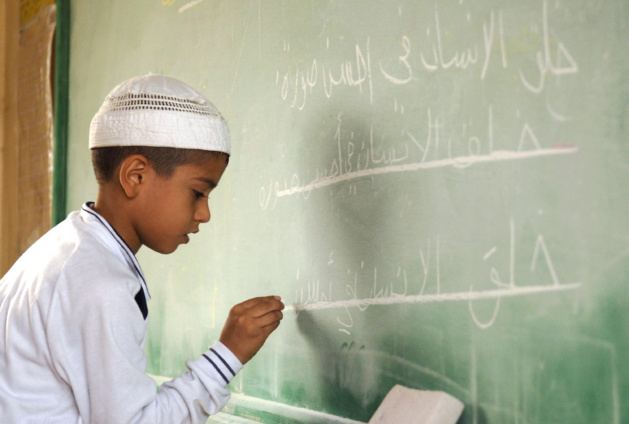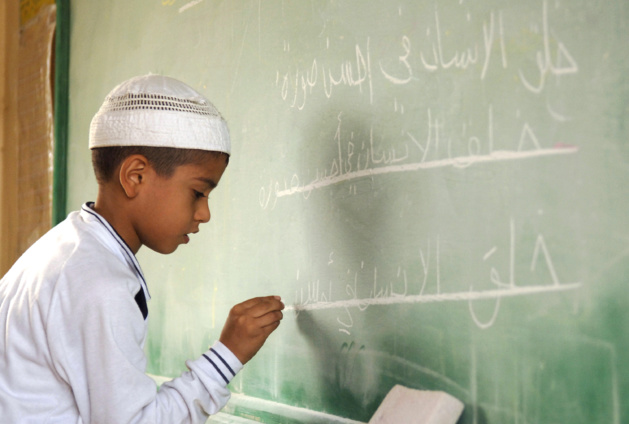
Credit : RR
At the dawn of the twentieth century, the Iraqi educational system was held in high esteem for its exemplary success in combatting illiteracy, but in 2015 it was criticised for disappointing results. Learning by heart too often leads to a standardisation of knowledge.
This knowledge serves to enable interregional understanding, in a country that suffers from internal divisions on an economic as well as political level. Understanding oil, tribal, religious and sectarian issues are far from straightforward. Where the education system should be making a point to harmonise these subjects, it is evident that it is not the case. Only the status quo reigns.
Memorising to the Detriment of Interpretation
The conflicts that choked the country during the 1990s, the Golf War and the United Nations sanctions that ensued contributed to the worsening of the education system. However, the budget allocated for this governmental department has also been diverted for the expense of war and profit. The budget for education has decreased to 20% of total state expenditure, instead being allocated to the military budget. The country has not invested in education as a potential mitigator of conflict.
On the contrary, since the overthrow of Saddam Hussein, the system of memorisation was kept as the common method of learning. In 1994 Saddam Hussein, President of Iraq from 1979 to 2003, sent his country into a “Faith Campaign”, aiming to promote Islam and thus counter the growing pro-Western sentiments, then present in the Middle East.
National education was one of the main instruments driving the campaign and underwent reform: memorising was instated. Religious lessons, during which students were required to learn verses of the Quran by heart, as well as religious leaders’ interpretations, were put into place.
The repercussions of these modifications are widespread: children between 6 and 11 years old are feeling the consequences of these changes. Schools have become a platform for Islamic propaganda. This “Faith Campaign”, according to sociologist and theorist Anthony Oberschall, corresponds to the organisational skills of Saddam Hussein.
Oberschall describes the process in four parts. The dissatisfaction of a segment of civil society leads to the creation of an ideology that responds to the demands of the people. Next a organisational capacity and mobilisation builds up, which provides a political opportunity.
Adopting this theory, many sociologists see religious indoctrination as a springboard towards a greater political project. Furthermore, imposing religious beliefs in schools can give rise to alarming consequences.
Memorisation: A Slippery Slope
Today, memorisation still exists, although the “Faith Campaign” and its religious lessons were definitely abolished since the US invasion in 2003. Memorisation, combined with the students’ lack of intellectual curiosity and the teachers’ lack of motivation, does not bring anything positive.
In Iraq it is not required to understand in order to learn, since exams are composed of questions whose answers are pre-formulated and only need to be memorised. Understanding does not come into the question for exams. This applies from primary school up until university.
Education for Dialogue and Dialogue through Education
Finishing a university course in Iraq is synonymous with being able to recite whatever subject imposed by the Ministry of Higher Education and Scientific Research at your fingertips. But are the students able to understand the wealth that is hidden in the ethnic, cultural, religious and natural diversity of their country?
The regional disparities which have their roots in this wealth add a level of complexity to the consequences of education on the political landscape of the country. The regional inequalities are deep-rooted, but cannot be understood without a willingness for dialogue. Myriam Benraad, Political Scientist at Sciences Po Paris and Specialist on Iraq, recently commented that an Iraqi dialogue must come through the path of federalism or from trans-sectional tribal alliances.
There is thus strong evidence to suggest that the solution to regional discord lies in the way to understand the discussion at the heart of the political Iraqi elite. Being able to understand and analyse thus seems to be the starting point for forming the leaders of tomorrow.




























